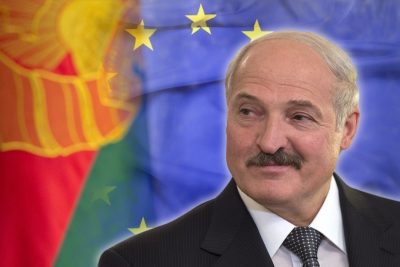European Union Sanctions Against Belarus Will Backfire and Deepen Minsk’s Ties to Moscow

Yesterday, it was agreed upon at the European Council special meeting that Belarus will be sanctioned. However, the scope of the sanctions and the long path to agree on them, demonstrates that the European Union is in a crisis and cannot project its power as it wishes. German Chancellor Angela Merkel described the bilateral agreement on Belarus and the strategic approach to Turkey as a step forward. The chancellor stated that “we had many discussions today on the issues of Belarus and Turkey, Cyprus and Greece. In short, I can say that they were completely successful.”
This comes in the aftermath of the Greek and Cypriot Prime Minister’s continually vetoing any sanctions against Belarus unless the European Council agreed to a strong joint statement against Turkey and for sanctions to be implemented by December if Ankara continues to violate the maritime space of Greece and Cyprus. Diplomatic sources in Athens revealed that despite the insistence of the majority of the European Council to pass a strong statement against Turkey and a pathway towards sanctions, Germany became isolated and had to eventually give up its resistance to stop an appeasement policy towards Turkey.
None-the-less, with Athens and Nicosia satisfied with the European Council’s statement and plan for sanctions against Turkey, the path was now open for Belarusian officials to be sanctioned without veto objections. This is despite Belarus not being a European Union member or candidate state, or threatening military action against EU member states like Turkey does.
“It was a long and difficult debate, because of course Greece and Cyprus demanded their rights as our member states. But we also had a very frank discussion about the need to look at all of our relations with Turkey,” Merkel said with seeming disappointment. “We can say today that there are sanctions against actors in Belarus, which means that the European Union is now taking action against those who oppose the democratic movements. I think this sends a very important signal.”
Minsk announced today the imposition of sanctions against European officials in response to those imposed by the European Union on Belarusian officials. The European Union claims that the officials who have been sanctioned are involved in the alleged suppression of anti-government protests and/or falsifying the August 9 elections in which President Alexander Lukashenko won 80.10% of the vote. Belarus’ foreign ministry said it had drawn up a list of European officials barred from entering the country, but added that the list would not be made public.
The European Union agreed to impose sanctions on some 40 Belarussian officials, however, Lukashenko is not among them. This in itself is a sign of weakness and desperation from the European Union as it strangely does not sanction Lukashenko, who won the election, but only those associated with him.
Lukashenko in recent years has been trying to court the European Union while also resisting further integration with Russia, even clashing with Moscow over gas and oil prices. Although protests against the election result had the appearance of a Ukraine-like colour revolution, the European Union immediately expressed solidarity, burning all bridges that had been built between Minsk and Brussels. This has only pushed Belarus firmly back into Russia’s sphere. The Belarusian President and his Russian counterpart Vladimir Putin held a meeting for over four hours in Sochi last month, which Russian spokesperson Dmitry Peskov said was “constructive, lengthy and substantive in content.” The meeting also resulted in a $1.5 billion loan for Belarus.
It is evident that the attempted colour revolution failed to materialize, Belarusian opposition leader Svetlana Tikhanovskaya has not amounted much domestic influence and Lukashenko will not be removed from power soon. Rather than attempting to quickly repair relations to bring Belarus back closer to Brussels, the sanctions demonstrates that the European Union is moving forward with its foreign policy blindly and against their own interests.
The problem the European Union has is that if it repairs its relations with Lukashenko, it will mean an acknowledgment of weakness as they were not able to achieve what they wanted in Belarus. This is in the midst of the European Union already being deeply divided between a small German-led bloc and the rest of the Union in policies towards Turkey.
Another conundrum for Brussels is that from Lukashenko’s perspective, the European Union is now untrustworthy. Successive provocations, like having diplomats lay flowers where rioters died and saying Lukashenko is an illegitimate president, has likely created a permanent rift between Minsk and Brussels. Therefore, coupled with newly passed sanctions, the European Union has lost all influence they once might have had on Minsk, and therefore weakened their own interests while strengthening Russia’s by forcing the deepening of Belarus’ ties with Moscow.
With the European Union’s divorce with the United Kingdom becoming uglier, having tense relations with Turkey, and the endless rift it has with Russia – all completely different issues to each other – European policymakers have demonstrated that they are incapable of self-reflection and identifying weaknesses and failures in their foreign policy. For what the European Union wanted to achieve in Belarus, it has been a serious failure. By not sanctioning Lukashenko, Brussels has left a door open to normalize relations. However, from Lukashenko’s perspective, he will likely end his years-long flirtation with Brussels and move to more deeply integrate Belarus with Russia.
*
Note to readers: please click the share buttons above or below. Forward this article to your email lists. Crosspost on your blog site, internet forums. etc.
This article was originally published on InfoBrics.
Paul Antonopoulos is an independent geopolitical analyst.
Featured image is from InfoBrics

